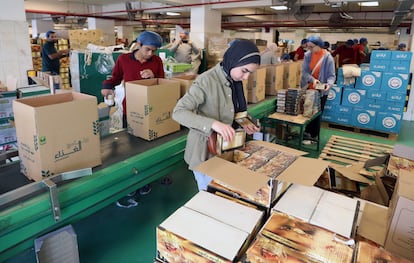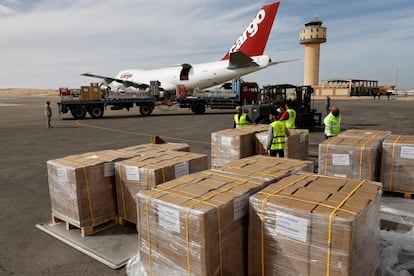Egypt prepares to increase humanitarian aid to Gaza after ceasefire deal between Hamas and Israel
Authorities in Cairo expect a substantial increase in deliveries to the Strip involving up to 400 trucks a day


Egypt began mobilizing Wednesday — following the announcement of a ceasefire of at least four days agreed between Hamas and Israel in Gaza — to substantially increase the delivery of humanitarian aid to the Strip, which has been devastated after a month and a half of the Israeli military offensive and the restrictions imposed on access to essential supplies.
During Wednesday, Egyptian authorities prepared the transfer of some 500 trucks from towns near the Rafah crossing, which connects Egypt to Gaza, to the holding area opposite. These are now ready for when the agreement comes into force and this additional aid flow is allowed in, state-run Al Qahera News reported. It is not yet clear how many trucks per day will be able to access Gaza for the duration of the ceasefire, but it is believed that the figure could reach 400 per 24 hours, according to the same outlet, which also reported that a greater flow of fuel into the Strip is expected.
Between October 21, when Israel resumed permitting humanitarian aid into Gaza after imposing a total blockade almost two weeks earlier, and November 21, around 1,400 trucks entered the Strip through Rafah, an amount considered a “drop in the bucket” of the needs of the Palestinian population in the enclave by humanitarian agencies. During the first half of this year, by contrast, an average of 9,500 trucks per month carrying commercial and humanitarian goods entered the Palestinian enclave, according to data from the United Nations office for Humanitarian Affairs (OCHA).
In parallel to the shipment of these supplies, the Israeli authorities only allowed the entry of fuel — essential for the daily operation of all kinds of basic services in the Strip — as of Saturday. Since then until Wednesday, however, only a total of 15 trucks were authorized to enter, and these were loaded with quantities far below those needed for the most critical humanitarian operations. The UN Relief and Works Agency for Palestine Refugees in the Near East (UNRWA) has indicated that it needs just over 160,000 liters of fuel per day to sustain its humanitarian operations in Gaza, but this amount has never been reached.

Egyptian authorities also reiterated Wednesday that the Rafah crossing is ready and able to take on the increased flow of humanitarian aid and fuel. Prior to the Israeli offensive in the Strip, the Kerem Shalom crossing, which connects to Israel, was the main entry point for goods into Gaza, but it has remained closed since the start of hostilities.
Movement through Rafah was initially disrupted for two weeks because Israel bombed the site three times in less than 24 hours after announcing its total siege on the Strip, causing significant damage to the Palestinian terminal. Since then — and until its partial reopening on October 21 — Israel has offered no security guarantees for any humanitarian aid convoys to cross.
In an attempt to reactivate the flow of aid, three days after the announcement of the total blockade of the Strip, Egypt designated El Arish airport, 45 kilometers (28 miles) from Rafah, as a logistics center to receive supplies destined for Gaza. Since then, shipments from multiple countries and UN and humanitarian agencies have arrived there.
Since aid began passing through Rafah again — following intense diplomatic efforts led by the United States and Egypt — truckloads of humanitarian supplies for Palestinians have arrived, albeit in dribs and drabs due to the conditions imposed by the Israeli authorities. Controls and limitations slowed the flow of aid, creating bottlenecks in El Arish, where large quantities of supplies are stalled, and abroad, with donor countries slowing down the delivery of more shipments to Egypt. International Criminal Court prosecutor Karim Khan warned in late October that preventing the delivery of humanitarian aid to Gaza may constitute a crime and stressed that Israel must ensure that residents of the Strip receive food, water, and medical supplies.
During a meeting in Cairo Wednesday, Egyptian President Abdel Fatah el-Sissi and his Jordanian counterpart, King Abdullah II, applauded the humanitarian truce in Gaza. However, they called on each other to maintain their diplomatic efforts to reach a permanent ceasefire and to ensure the delivery of sufficient aid to the population of the Strip to confront “the policies of famine and collective punishment” imposed by Israel.
Sign up for our weekly newsletter to get more English-language news coverage from EL PAÍS USA Edition
Tu suscripción se está usando en otro dispositivo
¿Quieres añadir otro usuario a tu suscripción?
Si continúas leyendo en este dispositivo, no se podrá leer en el otro.
FlechaTu suscripción se está usando en otro dispositivo y solo puedes acceder a EL PAÍS desde un dispositivo a la vez.
Si quieres compartir tu cuenta, cambia tu suscripción a la modalidad Premium, así podrás añadir otro usuario. Cada uno accederá con su propia cuenta de email, lo que os permitirá personalizar vuestra experiencia en EL PAÍS.
¿Tienes una suscripción de empresa? Accede aquí para contratar más cuentas.
En el caso de no saber quién está usando tu cuenta, te recomendamos cambiar tu contraseña aquí.
Si decides continuar compartiendo tu cuenta, este mensaje se mostrará en tu dispositivo y en el de la otra persona que está usando tu cuenta de forma indefinida, afectando a tu experiencia de lectura. Puedes consultar aquí los términos y condiciones de la suscripción digital.








































